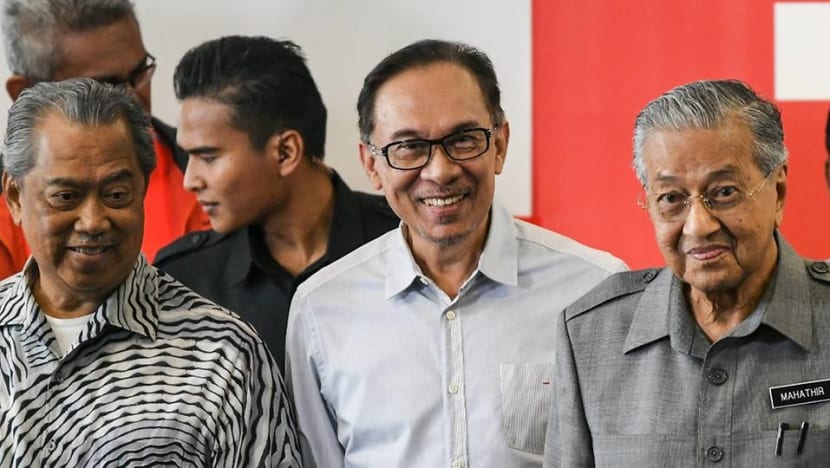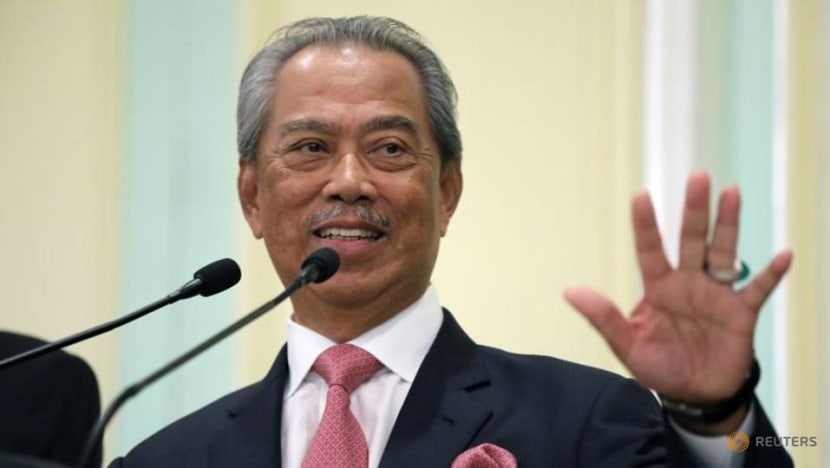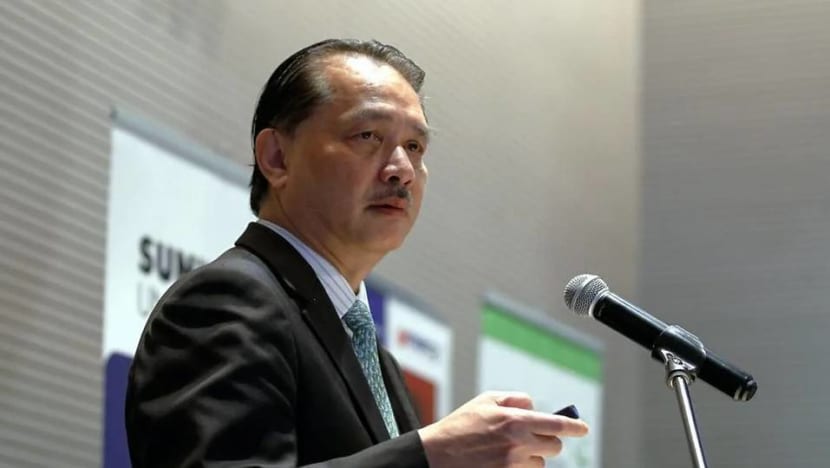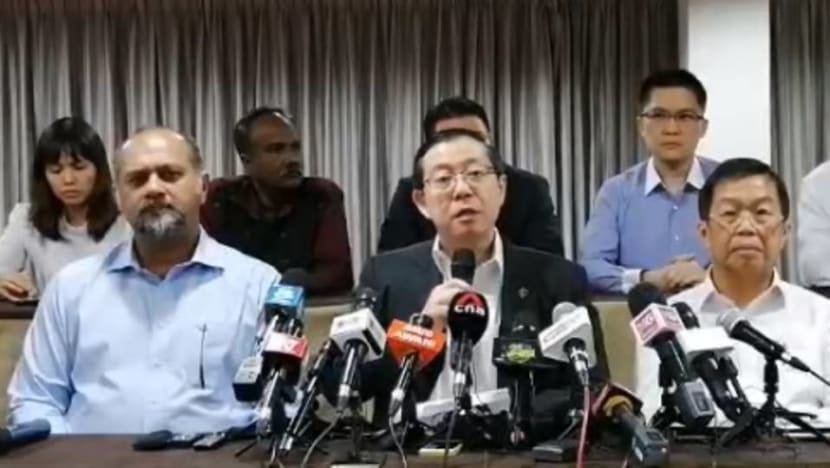commentary Commentary
Commentary: Wheels set in motion for another political showdown in Malaysia
The motion of no confidence in Prime Minister Muhyiddin Yassin is unlikely to be heard come May 18 when the Malaysian Parliament sits. But a brewing political contest is underway, says James Chin.

File photo of Dr Mahathir Mohamad (right), Anwar Ibrahim (centre) and Muhyiddin Yassin leaving after a press conference in Kuala Lumpur on Jun 1, 2018. (File photo: Mohd RASFAN / AFP)
TASMANIA: The Malaysian Parliament will sit for a single day on May 18.
This event is highly anticipated in the country’s political circles as it is the first time Parliament will be sitting since a new government was formed on Mar 1.
To recall, on the last week of February, the Pakatan Harapan (PH) government imploded when Parti Pribumi Bersatu Malaysia suddenly announced it would exit the ruling coalition and join with United Malays National Organisation (UMNO) and Parti Islam Malaysia (PAS) to form a new ruling coalition, Perikatan Nasional (PN).
To the surprise of many, after a series of confusing events, Muhyiddin Yassin, Bersatu’s number two, was sworn in as Malaysia’s eight prime minister. Many had thought Mahathir Mohamad will come back as prime minister of the PN coalition.
The sudden change of government created political uncertainty and heated charges of political illegitimacy were thrown around.

Voters had clearly voted out UMNO in the historic 2018 general elections, the narrative went. Yet, less than two years down the road, UMNO was not only back in power. This time, it was the biggest bloc in the new ruling coalition.
POLITICAL TWISTS AND TURNS
The PN coalition’s two months of governance has thrown up some surprising twists and turns.
The first is Muhyiddin’s demonstrated ability to hang onto power. This is no easy task. The man he replaced, Mahathir, has not stopped his campaign to pull Muhyiddin down to get his job back.
Mahathir had always believed he had the majority in Parliament and it was the King’s prerogative that allowed Muhyiddin to gain the upper hand.
READ: Commentary: Muhyiddin Yassin, the all-seasoned politician, who rose to Malaysia’s pinnacle of power
READ: Commentary: Was the Pakatan Harapan coalition doomed to fail from the start?
But now, Mahathir has put Muhyiddin on notice. A motion of no confidence in Muhyiddin has been tabled and accepted by the Speaker. If Muhyiddin loses the vote, political convention requires him to surrender the office.
But I do not think this happen. Under the present rules, government business gets priority and therefore it is unlikely Mahathir’s no-confidence will see daylight on May 18.
Second, the last two months has revealed covert conflict in the PN coalition between Bersatu, UMNO and PAS. UMNO (together with the remaining Barisan Nasional bloc) and PAS have decided to work as a single bloc within PN and have collectively about 60 MPs.
Muhyiddin’s Bersatu and friendly but minor parties account for way fewer MPs. The Gabungan Parti Sarawak (GPS) Sarawak bloc of 18 MPs are not officially part of PN but will likely support Muhyiddin’s leadership.

Given how much sway UMNO and PAS have, there is tremendous pressure on Muhyiddin to cede more political power to them
Third, and this is truly ironic, Bersatu is officially split. Muhyiddin was unable to sack Mahathir from Bersatu after the February meltdown and Mahathir remains Bersatu chairman.
Mukhriz, Mahathir’s son and political heir, is challenging Muhyiddin for Bersatu’s presidency later this year.
Mahathir knows he still holds sway with important figures in the party. Syed Saddiq, head of Armada, Bersatu’s youth wing, who was also formerly the Minister for Youth and Sports, has openly called on Muhyiddin to abandon PN and return to PH.
READ: Commentary: Mahathir Mohamad remains the eye of the political storm brewing in Malaysia
READ: Commentary: Malaysia’s political carousel brings a hit to its economy
WHAT COVID-19 HAS CHANGED
Fourth, amid the COVID-19 outbreak, the most popular leader in Malaysia is not Muhyiddin but the Director-General of the Health Ministry, Dr Noor Hisham, a civil servant.
He has been doing daily press briefings. Surveys after surveys show he is the most popular person in the country, so much so there are petitions asking Muhyiddin to appoint him as Health Minister.

Fifth, the COVID-19 crisis has crippled the Malaysian economy, like other countries around the world. Economics is front and centre on the minds of Malaysians. Millions are out of work yet restarting the economy will not be an easy task.
WHERE IS ANWAR IBRAHIM?
You may ask, where does Anwar Ibrahim figure in all these political games? The short answer is that he is still in the game but is marked as a “reserve” sitting out the game.
Officially, he is the opposition leader in the parliament but everybody knows if the prime minister role is vacated for one reason or another, Mahathir will be first in line. Mahathir is dead set on getting back his job before the next general election due in 2023.
The incredible thing is that nobody talks about Mahathir’s age - 95 this year - yet everyone in Kuala Lumpur expects him to take up the post again if PN falls apart.
Anwar’s biggest challenge is his appeal with rural Malays. His Partai Keadilan Rakyat (PKR) must make deeper inroads into the Malay heartland if he wishes to gain more support for PKR.
Yet, at present, Malay politics has been seen as a tussle between UMNO, PAS and Bersatu, leaving little space for Anwar and PKR. Anwar must wait for an opening, possibly even a split in the PN coalition, before he can form an alliance that can reach a wider Malay audience. Most of the Malay polity that believe in multiracial politics are already in PKR.
READ: Explainer - What are the possible scenarios of a no-confidence motion in Malaysian parliament?
WHERE THE REST OF THE PH COALITION IS AT
Where does this leave the Democratic Action Party (DAP), the biggest party in PH? This Chinese-based party appears to be the most cohesive.
During the recent political crisis, only three DAP state assemblymen switched sides. Its parliamentary wing remains largely intact. This is in stark contrast with 11 PKR MPs who defected or left the party.
In a twisted way, DAP is actually politically stronger now. While in PH government, DAP was accused of taking a lacklustre attitude towards Chinese issues and making too many compromises with Mahathir, who was seen as a strong Malay nationalist.
The DAP came under heavy, regular criticism by Chinese non-government organisations and interest groups, especially those promoting Chinese language and culture.

Now that the DAP is back in the opposition, their supporters have had a change of heart. They now think the new PN government will only pursue an agenda favourable to Malay issues and that they therefore need to provide stronger support to the DAP to counter this strong assertion of Malay political power.
THE SHOWDOWN MAY NOT MATERIALISE ON MAY 18
Chances that Mahathir’s no-confidence vote will be discussed are slim. As mentioned earlier, Parliament is scheduled to sit just a few hours on May 18. If protocols are followed, the King will give a speech laying out the agenda for government, and Parliament will adjourn thereafter.
Even if there is time, government affairs will likely take priority. If anything, the Malaysian government may table a separate motion of confidence in PM Muhyiddin, thus rendering Mahathir’s motion irrelevant.
So Mahathir, the PH coalition and more will have to fight another day.
In any case, there is little appetite for change. Ordinary Malaysians may have their interest piqued but do not really care about these political manoeuvrings. Malaysians are far more worried about the economy and COVID-19.
READ: Commentary: Restrictions on movements in some Southeast Asian countries to fight COVID-19 have been patchy, even scary
READ: Commentary: Malaysia is beating all these brutal COVID-19 expectations
The Movement Control Order (MCO) has exposed Malaysia’s economic weakness and the dire state of affairs for those in the lower-social economic class.
The countless reports of political parties and NGOs delivering rice to many households underline the economic aspect of this coronavirus crisis.
Perhaps, in a time of coronavirus, politics is a game only the rich can afford to play. For ordinary Malaysians, the immediate need is a job to go back to so that they can put food on the table.
READ: Commentary: Three underlying forces fuelled Malaysia's recent political crisis
BOOKMARK THIS: Our comprehensive coverage of the coronavirus outbreak and its developments
Download our app or subscribe to our Telegram channel for the latest updates on the coronavirus outbreak: https://cna.asia/telegram
Professor James Chin is Professor of Asian Studies at the University of Tasmania and Senior Fellow at the Jeffrey Cheah Institute on Southeast Asia.














